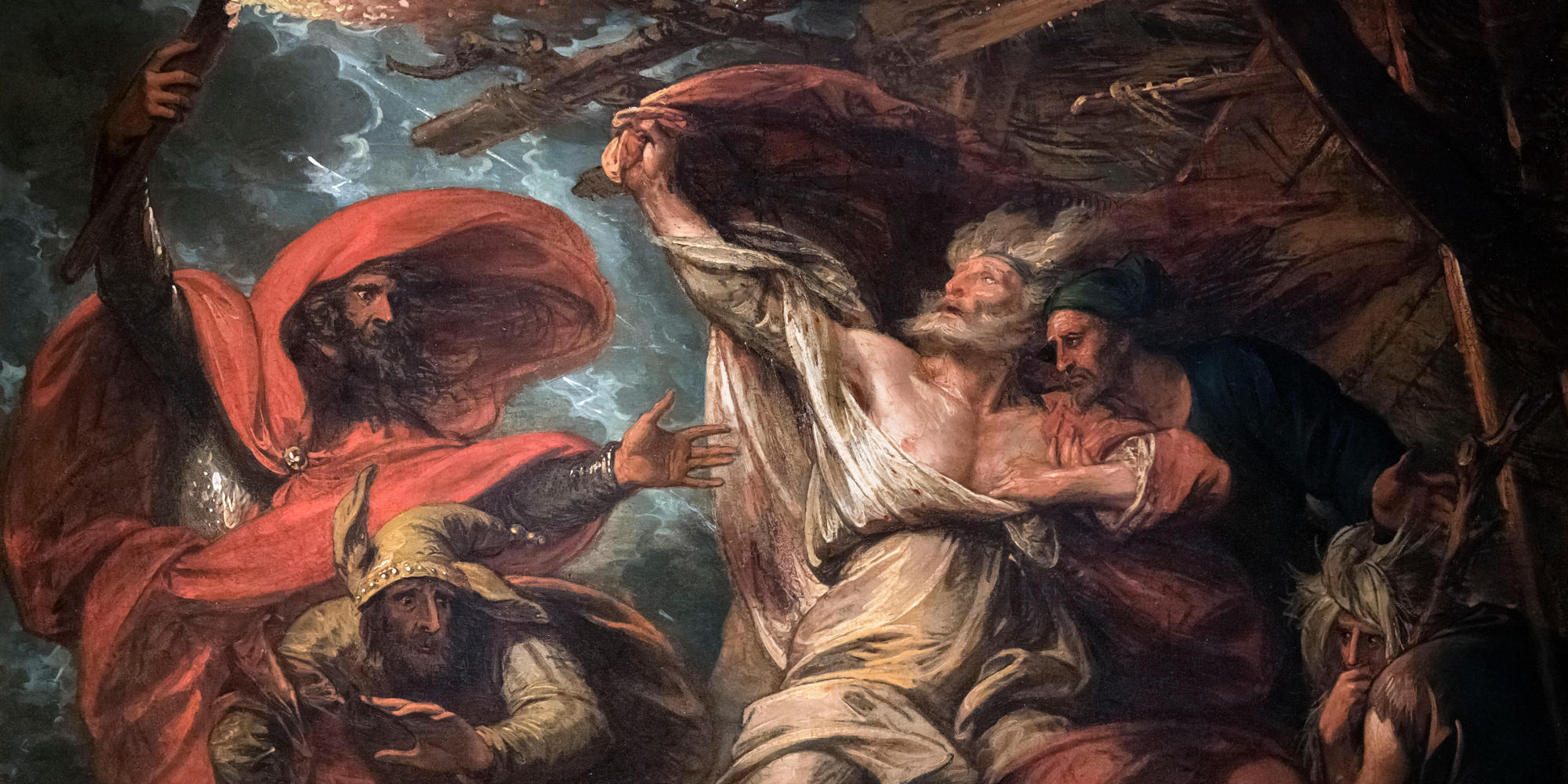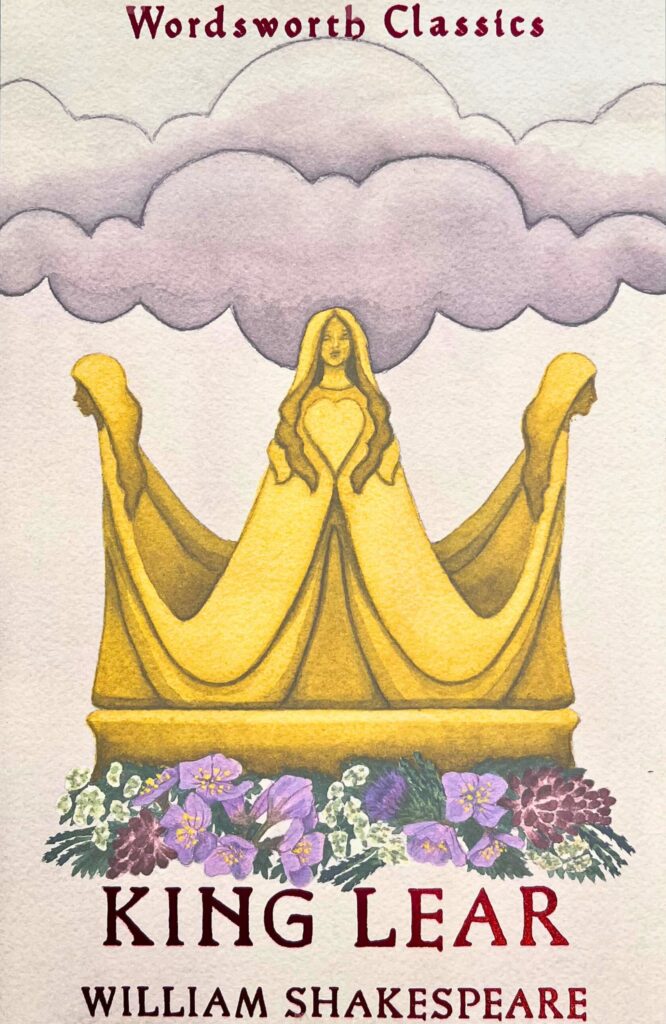
Mia Forbes looks at King Lear
Morality, justice and Christianity in King Lear By Mia Forbes
But God draws the mighty away with His power;
He rises up, but no man is sure of life.
– Job 24:22
The relationship between the Book of Job and King Lear has long provided fuel for the scholarly fire. Each is a story of suffering, endurance and loyalty, in which a prosperous man is stripped bare – both literally and figuratively – and loses the health, wealth and family he once prized. Those who have pursued this comparison, however, although content to bask proudly in the glow of complex literary parallels, have often failed to illuminate the real message at the heart of Shakespeare’s tragedy. Like the greatest works in the literary canon, the Book of Job and King Lear allow their audiences to delve deeply into the daunting problem of the human condition. While their social, political and historical contexts necessarily have great bearing on how each text is read, they share a central concern that transcends time and place: what it means to be alive and to be human.
Alongside their many notable similarities, from the tests of loyalty around which each is centred, to the storms which reduce both Lear and Job to their most vulnerable, there is a glaring difference between the two tales. After an intense period of suffering, Job is rewarded for his faith, supporting the Deuteronomic doctrine that promises reward for the righteous and punishment for wrongdoers. Lear, on the other hand, loses everything and dies, seemingly without compensation or explanation. The play’s dismal ending seemed so incongruous to early audiences that, in 1681, a new version by Irish poet Nahum Tate found favour. Its happier dénouement saw Lear survive and his kingdom inherited and ruled by the now-married Cordelia and Edgar
Yet Tate’s The History of King Lear was not an innovation; it was in fact Shakespeare who had revised the original story by killing off Lear and his one loyal daughter. The tale of the English king, which was first recorded in 1135 by Geoffrey of Monmouth, who dated it back to the eighth century BC, and which later appeared in a variety of works including Spenser’s The Faerie Queene, traditionally ends with Lear’s (or Leir’s) return to power. Shakespeare made the deliberate choice to turn this old story of inheritance, invasion and restoration into a tragedy that sees not only the controversial king but also his honourable and honest daughter meet a sorry end. Why he did so was a mystery even to the literary titan, Dr Johnson:
In the present case, the public has decided. Cordelia, from the time of Tate, has always retired with victory and felicity. And, if my sensations could add any thing to the general suffrage, I might relate, that I was many years ago so shocked by Cordelia’s death, that I know not whether I ever endured to read again the last scenes of the play till I undertook to revise them as an editor.
– Samuel Johnson, Preface to King Lear, 1765
Why is it that, in a narrative so informed by one of the most important writings on theodicy, Shakespeare appears to deprive his characters and his audience of an explanation for their suffering? One straightforward response might be that King Lear is a tragedy, and that unmitigated suffering should not therefore come as a surprise. Even a cursory glance at Shakespeare’s other tragedies, however, tells us that there is always meaning in the misery. Another response, indeed one voiced by many critics, could be that the Bard is using this play to express his religious doubts, and that Lear’s experience offers insight into the playwright’s tentative agnosticism. The work is certainly set in a pre-Christian England, but is it a pagan play?
In the first act, Lear claims that he is ready to relinquish power over his kingdom. Although he hopes that this early retirement will allow him an “Unburdened crawl toward death” (I.i.44), what actually follows is not a smooth and dignified journey through his final years, but a relapse into the helplessness of childhood. In his advanced age, Lear grows increasingly childlike in his obstinate demands (“bid them come forth and hear me / Or at their chamber-door I’ll beat the drum / Till it cry sleep to death” – II.iv.117-9), physical dependency (“Who are you? Mine eyes are not o’ th’ best.” – V.iii.335-6) and struggle to express himself (“Howl, howl, howl!” – V.iii.308). This regression has often been seem as the result of his frustration, as he finds himself powerless against his will. Despite his ostensible enthusiasm in abdicating his throne, it becomes clear that Lear is not yet willing to release control entirely.
The test of loyalty he gives each of his daughters at the start of the play demonstrates that Lear is still determined to have some degree of emotional leverage over them. In demanding their assurances of love, he shows that he will let go of his land but not of his power or pride, and the very act of prematurely dividing up his kingdom points towards a desperation to exert control over events that would naturally occur outside of his own lifetime. Similarly, rather than allow Cordelia to deny him the parental affection he craves, Lear rejects her: “Here I disclaim all my paternal care, / Propinquity, and property of blood, / And as a stranger to my heart and me / Hold thee from this forever.” (I.i.125-8). The king also attempts to retain part of his royal authority, exercising the power to banish subjects and demanding that he be allowed to keep an armed guard. His insistence that his band of knights should not be reduced in number has even been read by some as an elaborate pun on the word ‘nights’, implying a refusal to accept the shortening of his life.
Such reactions shed light on Lear’s need for control, which in turn leads to his refusal to accept that which is outside of his purview. His rejection of Cordelia following her honest but unwelcome admission, his stubborn determination to cling onto the vestiges of kingship, and his denial of death as the ultimate end to his power are the most important instances of this anxiety, but it is also manifested in the groundless rebuttals with which he contradicts other characters throughout the play. Self-deceiving and defensive, Lear offers a masterclass in how not to face old age, growing impotence and death.
Interestingly, Lear’s suffering also serves as a partial solution to his unhealthy desire for control, and denial of his own weakness, as through it he learns to accept reality. He abandons Goneril and Reagan after they refuse to respect his requests, and standing on the lonely heath amid a storm with only a fool for company, he comes to the realisation that he, “A poor, infirm, weak, and despised old man” (III.ii.22), no longer has the power to command authority as he once did. Lear’s anagnorisis remains incomplete, however, until the final act of the play, in the aftermath of Cordelia’s death.
From the beginning it is clear that Cordelia is to play a significant part in her father’s struggles. Shakespeare takes full advantage of the etymology of her name, peppering the dialogue with heart imagery and metaphors (the Latin cord- stem means ‘heart’), and thus hints at her fundamental role in matters of life and death. Lear himself acknowledges this mysterious power, anticipating early on that her absence will ultimately lead to his own end:
Hence and avoid my sight!—
So be my grave my peace as here I give
Her father’s heart from her.
– I.1.139-141
Freud went so far as to identify the youngest daughter as the play’s symbol of death and, accompanied by the predictable psychoanalysis involving incestuous feelings, interprets her hanging as the turning point in Lear’s attitude towards mortality:
Eternal wisdom, in the garb of primitive myth, bids the old man renounce love, choose death and make friends with the necessity of dying.
– Sigmund Freud, The Theme of the Three Caskets, 1925
Although Cordelia’s death leads directly to Lear’s own, the reconciliation between the two brings redemption as well as ruin. Cordelia, “Who redeems nature from the general curse” (lV.vi.209-210), returns from the safety of France with an army, to reinstate Lear to his throne, and to offer him the personal comforts and forgiveness he needs in his sickness. In this way, she is prepared to sacrifice both her pride and her own safety for the sake of the father who rejected her, vowing that “He that helps him take all my outward worth.” (IV.iv.10). Partially revived by her efforts, Lear recognises Cordelia as “a soul in bliss” (IV.vii.47) and begins to yield to a her as a higher power: “If you have poison for me, I will drink it” (IV.vii.71).
Such imagery has naturally led to comparisons between Cordelia and Christ, but again we are faced with a provocative difference between scripture and stage. Jesus dies for the sake of man’s sins and is gloriously resurrected, while Cordelia’s death is final and apparently fruitless, since Lear’s final lines, in which he convinces himself that he sees life in the face of his daughter’s corpse, suggest that he has lapsed into his old pathological habits of denial, anger and delusion. His initial reaction, however, indicates that Cordelia’s death has reconciled the king, or at least opened his eyes, to the undeniable fact of human mortality. His hopeless cry of “Never, never, never, never, never.” (V.iii.372) and his bitter question of “Why should a dog, a horse, a rat have life, / And thou no breath at all?” (v.iii.370-1) point towards an acknowledgement, even an acceptance, of death.
Her self-sacrifice does not, and cannot, stop the old man from dying, but this double death need not entail a godless abyss. Lear makes no mention of heaven or the prospect of life after death, but it seems natural that such ideas would present themselves to both Shakespeare and his immediate audience, immersed as they were in Biblical imagery and Christian belief. We can thus distinguish in the narrative a movement towards redemption and the transcendent. Through his own suffering, Lear feels the effects of his earlier actions and learns his limitations; through Cordelia’s sacrifice, he is brought face to face with the brutal fact of mortality; at the moment of his own death, it is down to the audience to decide whether it is a blessing or a curse. Kent’s reaction seems to favour the former interpretation:
Vex not his ghost. O, let him pass! He hates him
That would upon the rack of this tough world
Stretch him out longer.
– V.iii.380-2
Kent laments the physical torment one faces in the world as part and parcel of being human, but his words also hint at the hope of better things to come and a new world into which each of us will eventually “pass”. In this way, the tale of suffering, loss and death clearly can be interpreted as an expression of Christian beliefs. Lear’s story may be as uncomfortable, severe and troubling as that of Job but, like “the greatest poem of ancient and modern times”, it lays bare the harsh fact of mortality, highlights the limits of human power, and encourages its audience to contemplate whether death is really the ultimate punishment. Without resorting to the artificial interpolation of divine intervention in a pre-Christian legend, Shakespeare deftly handles the themes of humility, adversity and mortality with a view to the transcendent. Hardship, like death, is an inevitable feature of human life, and one not necessarily at odds with theodicy. As Edgar states:
Men must endure
Their going hence even as their coming hither. Ripeness is all.
– V.iii.10-12
Image: King Lear by Benjamin West (1738-1820), oil on canvas, 1788.
Credit: Ian Dagnall Computing / Alamy Stock Photo
Books associated with this article
